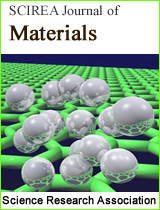Viscosity of CNT Loaded Epoxy Resin
DOI: 302 Downloads 17395 Views
Author(s)
Abstract
The processing of fibre reinforced carbon nanotube (CNT) loaded polymer composites (nanocomposites) requires that CNTs be mixed (or loaded) into the polymer prior to impregnating the fibres to fabricate a nanocomposite. The fabrication process uses vacuum-assisted resin transfer moulding (VARTM), which is complicated due to the increase in viscosity of CNT loaded resin. The goal of this paper is to experimentally characterize the viscosity of a CNT loaded epoxy resin, with different weight percentages and shear rates. The maximum viscosities measured for the samples were: 800 cP for 0.2 %wt., 750 cP for 0.4%wt., and 890 cP for 0.6 %wt. All samples exhibited shear thinning behaviour as the viscosity decreased with increased shear rates.
Keywords
Carbon Nanotubes, viscosity, epoxy
Cite this paper
Hector Estrada, Luke S. Lee, Jonathan Trovillion, Maciej Tusz, Ashok Kumar, and Larry D. Stephenson,
Viscosity of CNT Loaded Epoxy Resin
, SCIREA Journal of Materials.
Volume 3, Issue 1, February 2018 | PP. 1-9.
References
| [ 1 ] | E.T. Thostenson and T.-W. Chou, Carbon, 44 (2006): p3022-3029. |
| [ 2 ] | K.G. Budinski and M.K. Budinski, Engineering Materials: Properties and Selection. 9th Ed. Prentice Hall, 2010, Columbus, OH. |
| [ 3 ] | P.K. Mallick Fiber-Reinforced Composites: Materials, Manufacturing and Design. 3rd Ed. CRC Press, Florida, 2007. |
| [ 4 ] | S. Iijima, Nature, 354 (1991): p56-58. |
| [ 5 ] | J.N. Coleman, U. Khan, U.J. Blau, and Y.K. Gun’ko, Carbon, 44 (2006): p1624-1652. |
| [ 6 ] | X.-L. Xie, Y.-W. Mai, and X.-P. Zhou, Materials Science and Engineering: R: Reports, vol. 49 (2005), no. 4: p89-112. |
| [ 7 ] | F.H. Gojny, M.H.G. Wichmann, B. Fiedler, and K. Schulte, Composites Science Technology, 65 (2005): p2300–2313. |
| [ 8 ] | B. Fiedler, F.H. Gojny, M.H.G. Wichmann, M.C.M. Nolte, and K. Schulte, Composites Science and Technology, 66(16) (2006), p3115-3125. |
| [ 9 ] | T. Panagiotou, J.M. Bernard, S.V. Mesite, Deagglomeration and dispersion of carbon nanotubes using MicrofluidizerTM high shear fluid processors, NSTI-Nanotech 2008, ISBN 978-1-4200-8503-7, Vol. 1 (2008), p39-42. |

